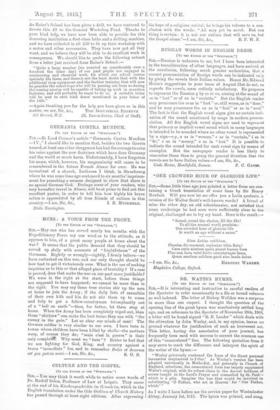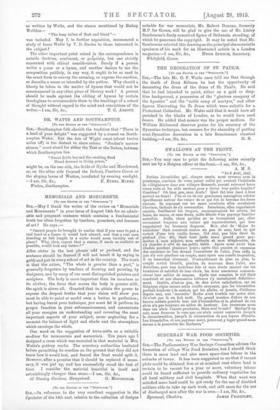DR. WATTS'S HYMNS.
[TO Tun EDITOR OP TUE "SPECTATOR:9 SIB,—It is interesting and instructive to careful readers of the Spectator to refer occasionally to a file or bound volumes so well indexed. The letter of Bishop Welldon was a surprise in more than one respect. I thought the question of the opening line of the great hymn was conclusively settled long ago, and on reference to the Spectator of November 28th, 1903, a letter will be found signed "R. E. Leader" which deals with
the alteration by John Wesley, and, in my opinion, leaves no ground whatever for justification of such an irreverent act.
This letter, having the association of your journal, has frequently been used with success to correct the common use of this "emasculated" line. The following quotation from it may serve to mark the difference and interpret the spirit of the writer of the hymn :— "Wesley grievously weakened the force of the direct personal invocation emphasized in 'Our.' As Wesley's version has been adopted universally in Methodist, and generally in Church of England, selections, the emasculated form has largely supplanted Watts's original, with its robust claim to the devout boldness of access taught in the Lord's Prayer and counselled by St. Paul— which is a pity. Imagine the loss that would be involved in substituting '0 Father, who art in Heaven' for Our Father, which.'" As I write I have before me the service paper for Westminster Abbey, January 1st, WU The hymn was printod, and sung,
as written by Watts, and the stanza mentioned by Bishop Welldon- " The busy tribes of flesh and blood "— was included. May I. in further exposition, recommend a study of Isaac Watts by V. D. Davies to those interested in the subject ?
The other important point raised in the correspondence is outside doctrine, sentiment, or propriety, but one strictly concerned with ethioal consideration. Surely if a person writes a poem or a hymn, and another desires to use the composition publicly, in any way, it ought to be so used in the erect form to convey the meaning, or express the emotion, or describe a scene as intended by the author. Why should a liberty be taken in the matter of hymns that would not be countenanced in any other piece of literary work ? A protest should be made against the editing of hymns by certain theologians to accommodate them to the teachings of a school of thought without regard to the mind and convictions of the



































 Previous page
Previous page